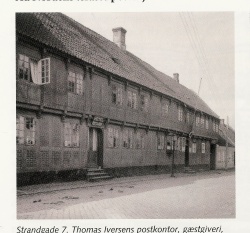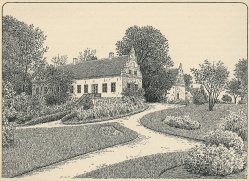Cover Addresses and Intrigues in Assens - Broken Seals 2
01. Nov. 2005

The Post Office at no. 7 Strandgade in Assens, which from the early 19th century became an inn named "The Post Yard". Photo: The Royal Library.
On 7th March 1714 postmaster Hans Adolph Tho-massen Carl from Assens wrote to post controller Christian Erlund in Copenhagen to ask for advice and support in a difficult matter. Carl had conceived a suspicion of some letters, but apparently he dared not involve the local police authorities as he was actually supposed to.
With the last mail from Copenhagen Carl had found a parcel of letters for the local nobleman, Axel Ro-senkrantz at Damsbo near Assens "and the same parcel of letters seemed quite mysterious and par-ticularly suspicious to me [...] that in the same parcel I guess there were as many as 7 or 8 large, sealed letters, and the address on the letter to the aforesaid Rosenkrands was written by the French resident M. Poussin whose hand-writing is very well-known to me; in addition the letter was sealed with the signet of the said M. Poussin." Carl added that his suspi-cion had been entertained as he knew that the nobleman and the resident were "very good friends which is evident from their constant correspond-ence" and that he was wondering why the Frenchman would send 7-8 letters to his friend at the same time, but especially why at "Rosencrans [there is] daily full of Swedish high-ranking officers who are stationed in Faaborg, and they seem to have with him their Rendezvous at his estate Damsboe which is only a mile away from Faaborg". He had also found a letter for one of these officers in a letter from the nobleman.
Possibilities of Surveillance
It is hard to believe that it should be difficult to survey monitor the limited number of letters passing through Denmark in the early 18th century. There were only few postal routs; all letters to foreign countries went through either Elsinore or Hamburg and the vast majority went through the General Post Office in Copenhagen. However, a number of ordinances indicate the difficulties. Already in 1683 titular Privy Councillor Michael Vibe had received a royal ordinance to monitor all letters which were transported by the Danish post service to Sweden "as we suspect that in our kingdom there may be several persons advising to Sweden what is somehow befalling us". The letters were to be opened at the Copenhagen post office where strict professional secrecy was imposed on the postmaster. Vibe was to inform the king immediately about all interesting news. How long the ordinance was valid is hard to say, but even in 1712 letters were being read at the Copenhagen post office it appears from an instruction to cease "the arresting which has been carried out in the seat of the royal monarch with regard to letters from certain Amsterdam merchants and which have been under the covers of our subjects, concerning their commerce to and from Stockholm".
The new ordinance shows that a problem had emerged: that sly writers were using cover addresses - they were writing under other people's "cover", i.e. clandestinely had their letters enclosed in other people's innocent-looking letters or parcels.

Damsbo manor house. Illustration from J.P. Trap, "Kongeriget Danmark" [The Kingdom of Denmark] , vol. 3, 1894.
Elsinore in the Searchlight
The same year it was imposed on the post service to open all letters from Hamburg to Elsinore. The town at the Sound was in the searchlight of the authorities as the place from where under cover intermediaries could easily have their letters sent on to Sweden via the Swedish post office in town. Moreover, the same spring it was impressed upon citizens and inhabitants of Elsinore that "on confis-cation of all means and life sentence they abstain from conveying any Swedish letter or merchandise and they have nothing to do with such matters in any way, neither directly nor indirectly".
One Big Centre of Espionage
The following year the post service was transformed into one big centre of espionage. In June 1713 came a new ordinance extending the surveillance to cover all post offices in the country. It had prob-ably been discovered that the Swedes might also use intermediaries from other parts of the country to hide their secret letters. A letter from Hamburg to Assens was not as suspicious as a letter from Ham-burg to Elsinore, and a letter from Assens to Elsinore did not look suspicious either. In the ordinance the responsibility for opening letters was imposed on the local police authorities who together with the postmaster should open suspicious letters and report what they found.
Exposures
But why did Carl in defiance of his instructions contact Erlund instead of involving the local police authorities? It appears from the following letters from Carl that he feared the nobleman. Erlund had given him the go-ahead to send the suspicious parcels and asked him to keep a sharp watch on Ro-senkrantz. The parcel from Poussin obviously contained news of interest to the government, but we do not know what kind. Since then Carl had discovered that suspicious persons from Hamburg were writing to Damsbo and that high-ranking Swedish officers were still visiting or staying at the estate. The letters leave the impression of a postmaster who not only observed what went through his hands, but at the same time was part of a local community and could use the knowledge circulating in town for his own "intelligence service".
The post office was the perfect place to collect knowledge of who was writing and visiting whom. The postmaster was familiar with the handwriting and seals of all corresponding inhabitants in town, and in some cases, even their most frequent non-local correspondents. Carl was cognizant of Rosen-krantz' friendships through the nobleman's correspondence, he knew who was staying with him, he recognized the handwriting and estimated by the size of the parcels that they might contain secret (and illegally) enclosed letters.
But in the local community the postmaster was no anonymous, invisible person either, and Carl's letters clearly express his anxiety that his opening of letters might be disclosed - and he is almost panicking when it happens! In his first letters he is asking in the beginning as well as in the end "that nobody will be told as is right and proper". And in December he is writing to Erlund again, this time to report that Rosenkrantz has found out that his letters have been intercepted and that he has com-plained to the government. And moreover, the nobleman had obviously realized who has intercepted his letters: "Enfin, I assure you that in public company he has in dark speeches been sarcastic on my expense, so unmistakeably that anybody could understand it whilst I have not betrayed that I was able to fathom his opinion. Even in notes to me without the signature of his hand he has clearly uttered his point to me".
A reputation of being someone who opened other people's letters was, of course, one of the worst things that could happen to a postmaster - and Carl feared the nobleman's powerful position in soci-ety so he begged Erlund for protection "that I shall not because of this be subjected to the hatred of Rosencrans or any of his relatives as it has already come to pass [...] It is well-known to you, noble Monsieur, that the Rosencrans family here in Denmark is closely related to the most high-born old Danish aristocracy". The postmaster had only acted according to "my most humble duty and my oath to my most gracious king and master". To emphasize his plea for protection Carl even sent a small bribe (via Erlund's stepfather, post rider Elias Levesen) in the form of "seven kilos of pickled mussels, please accept them". Carl's fear is undoubtedly caused by the possibility that information about the interception of letters may have percolated from Copenhagen - he asks Erlund to make sure that only titular Privy Councillor Ditlev Vibe sees the intercepted letters.
It is somewhat unsatisfactory that we do not know the case progressed, what happened to Axel Ro-senkrantz or what the letters revealed. One thing is, however, quite certain: The have hardly been good friends, the nobleman and the postmaster from Assens. Postmaster Carl died in 1717 and Axel Ro-senkrantz in 1724.
The story about Erlund and his servants continues ...
This article may be copied or quoted with MuseumsPosten, Post & Tele Museum as source.
Comment this article
Only serious and factual comments will be published.